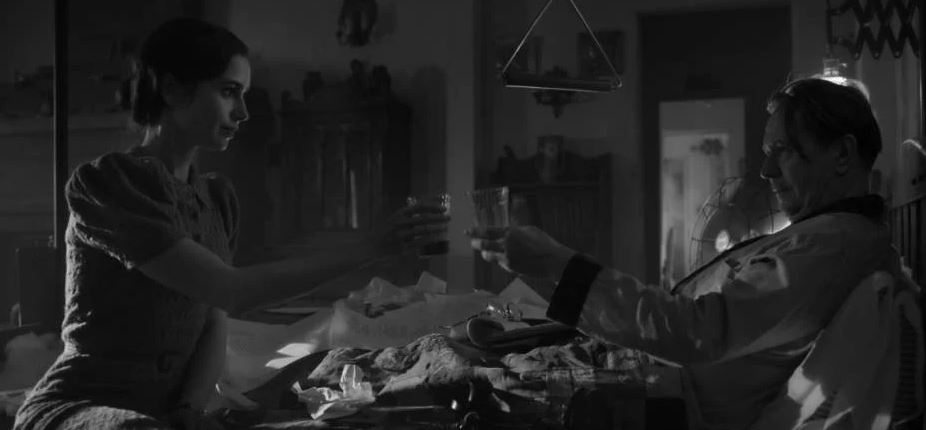| Worth seeing: | as a revealing and nostalgic peak behind the scenes of one of the classics of Hollywood |

| Director: | David Fincher |
| Featuring: | Gary Oldman, Lily Collins, Sam Troughton, Tom Burke, Amanda Seyfried, Arliss Howard, Charles Dance, Ferdinand Kingsley, Jamie McShane, Joseph Cross, Leven Rambin, Monika Gossmann, Toby Leonard Moore, Tom Pelphrey, Tuppence Middleton |
| Length: | 131 minutes |
| Certificate: | 12A |
| Country: | US |
| Released: | 20th November 2020, now available on Netflix |
WHAT’S IT ABOUT?
In 1940s Hollywood, an upstart director Orson Welles (Tom Burke) is given the freedom to make whatever film he wants.
He hires a respected – but slightly faded – writer, Herman Mankiewicz (Gary Oldman) to write him the screenplay that would become one of the most lauded films in cinema history, Citizen Kane.
Having just broken his leg in a car crash, Mank, as he was known, retreats to a house in the California desert, with a secretary (Lily Collins) and a nurse (Monika Gossmann).
Under the supervision of Welles’ producer and trusted lieutenant, John Houseman (Sam Troughton), Mank gets to work on the script, battling the odds – and his penchant for alcohol – to get it finished on time, without causing ructions in Hollywood.
WHAT’S IT LIKE?
Like many releases these days, after a brief theatrical outing, Mank was soon available to stream.
For film fans, it’s a shame to miss out on the big screen experience as the authentic black-and-white cinematography – complete with “reel change” markers – provide a nostalgia for the golden age of cinema.
There are even some unintended nods to today’s strange world, including the observation that part of the film was set at a time when the studios were desperate to get people back into cinemas and workers were asked to accept salary cuts to keep their jobs in a financial crisis. Sound familiar?
Mank will be best enjoyed by those with some background knowledge – of Citizen Kane and the politics swirling around the industry at the time – but even those new to the work will find much to enjoy, not least Gary Oldman’s turn as the shamelessly abrasive writer, who doesn’t care who he upsets. Having fallen out with the powerful media magnate William Randolph Hearst, several years earlier, Herman Mankiewicz uses this screenplay as an opportunity to take a sly dig at him.
It’s particularly gratifying to spend time with a mellifluous wordsmith, whose every sentence is carefully structured to make the most impact.
David Fincher’s film – penned by his late father and based on a respected but contested essay by the celebrated film critic Pauline Kael – intersperses Mank’s writing process with flashbacks of his more influential moments during the 1930s and includes visits from his brother Joe and from John Houseman, who express various concerns about the way the script is coming along; is it too convoluted, are allusions to Hearst going to damage the film?
But ultimately, perhaps the biggest controversy surrounding the film is whose name would appear in the final credits as the writer, which could have resulted in Mank delivering one of the most cutting Oscar-acceptance speeches in history – had he turned up on the night.
